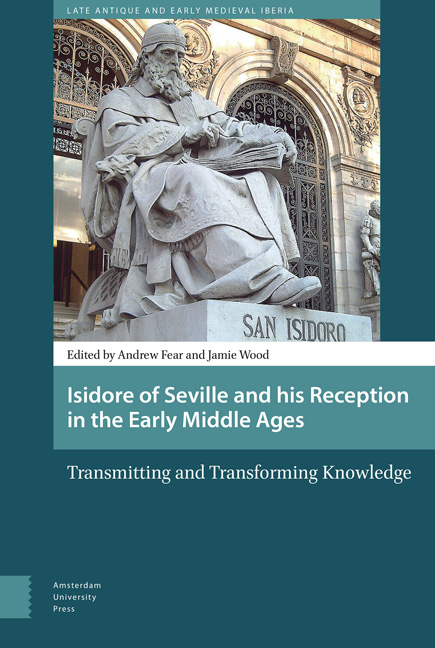 Isidore of Seville and his Reception in the Early Middle Ages
Isidore of Seville and his Reception in the Early Middle Ages Book contents
- Frontmatter
- Contents
- Preface: Paul Fouracre, University of Manchester
- 1 Introduction
- 2 A Family Affair: Leander, Isidore and the Legacy of Gregory the Great in Spain
- 3 Variations on a Theme: Isidore and Pliny on Human and Human-Instigated Anomaly
- 4 Putting the Pieces Back Together: Isidore and De Natura Rerum
- 5 The Politics of History-Writing: Problematizing the Historiographical Origins of Isidore of Seville in Early Medieval Hispania
- 6 Isidorian Texts in Seventh-Century Ireland
- 7 Isidore of Seville in Anglo-Saxon England: The Synonyma as a Source of Felix’s Vita S. Guthlaci
- 8 Hispania et Italia: Paul the Deacon, Isidore, and the Lombards
- 9 Rylands MS Latin 12: A Carolingian Example of Isidore’s Reception into the Patristic Canon
- 10 Adoption, Adaptation, & Authority: The Use of Isidore in the Opus Caroli
- Abbreviations
- Index
7 - Isidore of Seville in Anglo-Saxon England: The Synonyma as a Source of Felix’s Vita S. Guthlaci
Published online by Cambridge University Press: 12 December 2020
- Frontmatter
- Contents
- Preface: Paul Fouracre, University of Manchester
- 1 Introduction
- 2 A Family Affair: Leander, Isidore and the Legacy of Gregory the Great in Spain
- 3 Variations on a Theme: Isidore and Pliny on Human and Human-Instigated Anomaly
- 4 Putting the Pieces Back Together: Isidore and De Natura Rerum
- 5 The Politics of History-Writing: Problematizing the Historiographical Origins of Isidore of Seville in Early Medieval Hispania
- 6 Isidorian Texts in Seventh-Century Ireland
- 7 Isidore of Seville in Anglo-Saxon England: The Synonyma as a Source of Felix’s Vita S. Guthlaci
- 8 Hispania et Italia: Paul the Deacon, Isidore, and the Lombards
- 9 Rylands MS Latin 12: A Carolingian Example of Isidore’s Reception into the Patristic Canon
- 10 Adoption, Adaptation, & Authority: The Use of Isidore in the Opus Caroli
- Abbreviations
- Index
Summary
Recent scholarship has demonstrated that Isidore was, together with Augustine, Jerome, and Gregory, one of the four major patristic authorities for the Anglo-Saxons, and his Etymologiae, De natura rerum, Synonyma, and De ecclesiasticis officiis belonged to the ‘small core of staple patristic texts’ housed in a typical Anglo-Saxon library. Isidore undoubtedly proved an influential source for a variety of fields of Anglo-Saxon literary culture, ranging from grammar to computus, from history to homiletics and hagiography, from exegesis to charters.
This chapter focuses on the Synonyma and investigates, in particular, their role as a source for one of the founding and most popular Anglo-Saxon hagiographies, the Vita Sancti Guthlaci (henceforth VSG), authored by the elusive Felix in the first half of the eighth century. The Synonyma have not been enlisted among the rich network of source texts underlying Felix’s work until very recently. The case study in this chapter will hopefully contribute valuable insights into the early dissemination of the Synonyma in Anglo-Saxon England and enhance our understanding of the subtle ‘sourcelayering’ which can be considered Felix's most distinctive compositional technique.
The Synonyma
Generally grouped with Isidore's minor and juvenile works, the Synonyma enjoyed an ‘immense’ popularity and were the third most copied work by Isidore after the Etymologiae and the Sententiae. Alternatively classified as a grammatical, ascetic, and dogmatic text, the Synonyma resist any clearcut categorisation. They consist of two books, one decidedly different from the other as to theme, tone, and sources employed. The first contains an effusive and pathetic lamentation (lamentum paenitentiae) expressed by a sinful man overwhelmed by guilt and despairing of redemption, while in the second book Reason draws a very detailed norma uiuendi for the penitent, consisting of pragmatic prescriptions and precepts to pursue a virtuous lifestyle and resist temptations. The penitential lament and hortatory consolation are distinctively combined with a most idiosyncratic style, the so-called stilus ysydorianus, a rhymed, rhythmical prose making pervasive use of synonymical variation and paraphrase, which was to become one of the four major kinds of Latin Kunstprosa in the Middle Ages. It was this characteristic blend of eloquium and uotum, to put it in Isidore's own words, that secured the Synonyma an exceptionally vast and enduring popularity throughout the Middle Ages in the Latin West, firstly as a spiritual primer and, secondarily, as a grammatical handbook.
- Type
- Chapter
- Information
- Isidore of Seville and his Reception in the Early Middle AgesTransmitting and Transforming Knowledge, pp. 131 - 158Publisher: Amsterdam University PressPrint publication year: 2016


